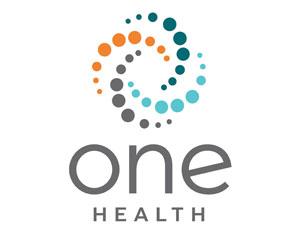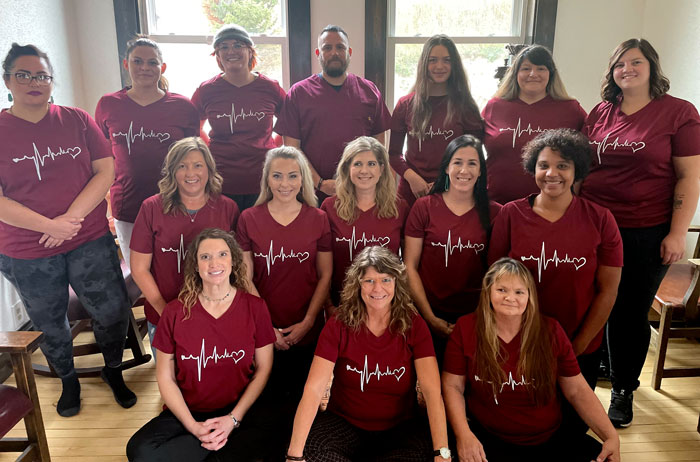One Health Recovery Doulas
- Need: To support pregnant and parenting women with a history of substance use, mental health, or co-occurring disorders in rural areas of Montana.
- Intervention: One Health, a consortium of Federally Qualified Health Centers (FQHCs), developed a team of "recovery doulas" – individuals who are dual-certified as doulas and peer-support specialists. The One Health recovery doula program offers group and individual services to women and their partners from pregnancy through the first years of parenthood.
- Results: A team of four recovery doulas (or doulas-in-training) employed by One Health offer services in 8 rural eastern Montana counties. One Health has also successfully trained and certified 35 Peer Recovery Doulas statewide through their Peer Recovery Doula certification curriculum.
Description
 One Health is a consortium of
Federally Qualified Health Centers (FQHCs) serving
several counties in rural Montana. Since 2017, One Health
has implemented a variety of program models to expand
services for pregnant women with substance use disorder:
a home-visiting nurse, the development of a peer support
team, and the creation of peer support drop-in centers.
These initial programs were supported by grants from the
Rural Health Opioid Program (RHOP) and the Rural
Communities Opioid Response Program (RCORP) and
partnerships with the Montana Department of Health and
Human Services and the Montana Healthcare Foundation.
One Health is a consortium of
Federally Qualified Health Centers (FQHCs) serving
several counties in rural Montana. Since 2017, One Health
has implemented a variety of program models to expand
services for pregnant women with substance use disorder:
a home-visiting nurse, the development of a peer support
team, and the creation of peer support drop-in centers.
These initial programs were supported by grants from the
Rural Health Opioid Program (RHOP) and the Rural
Communities Opioid Response Program (RCORP) and
partnerships with the Montana Department of Health and
Human Services and the Montana Healthcare Foundation.
During the COVID-19 pandemic, program organizers observed that doulas were being permitted to accompany pregnant women to appointments and births, but peer support specialists were not. Additionally, program organizers observed that their clients were at higher risk for relapse and suicide in the hours and days immediately following birth. These concerns led to the idea to create a team of "recovery doulas" — individuals who are dual-certified as doulas and peer-support specialists.
One Health has also developed and implemented the Recovery Doula Training Program to train new recovery doulas and build this workforce throughout Montana. The program is a year-long course that blends online learning, group collaboration, and hands-on in-person training, leading to state certification as a recovery doula.
The One Health recovery doula program is supported by The Montana Department of Public Health and Human Services' Strengthening Families Initiative (SFI) funded through a SAMHSA State Pilot Grant Program for Treatment for Pregnant and Postpartum Women (PPW-PLT) grant and also receives funding from a HRSA RCORP Neonatal Abstinence Syndrome (NAS) grant.
Recovery doulas are trained in delivery positioning skills and all other skills for traditional doula practice, in addition to:
- Labor supports
- Calming babies
- Feeding babies
- Substance-affected infants (NAS/NOWS)
- Social determinants of health
- Motivational interviewing
- Intimate partner violence
- Sexual abuse
- Basic business marketing
- Medications for opioid use disorder (MOUD) during pregnancy
- Family plan of safe care
- Screening, brief intervention, and referral to treatment (SBIRT)
- Perinatal mental health and substance use disorders
- Infant and early childhood mental health
- Parent-child attachment
- Resiliency and protective factors
- Trauma informed care
- Tribal traditions of perinatal care
- Cultural safety
- Emotional regulation/attunement
- Wellness Recovery Action Plans (WRAP)
Services offered

A team of trained recovery doulas provide services to pregnant and parenting women and families in 13 rural Montana counties. The Crow Indian Reservation, Northern Cheyenne Indian Reservation, and the Fort Belknap Indian Reservation are located within this service area.
Individuals are usually referred to the program by emergency departments, clinics, Child Protective Services (CPS), and community health and behavioral health providers. Individuals may also self-refer.
Group services include:
- Classes on parenthood, including classes designed specifically for tribal populations
- Perinatal groups
- Trauma-based groups for women and men
- Mental and physical wellness groups
- Fitness groups, including a stroller fitness group for moms
- Art-therapy groups
- Recovery groups
- Contingency management groups
- Birth preparation groups
Individual services include:
- Weekly one-on-one visits with a peer support specialist
- Individualized doula services (including assistance with household chores, preparing the baby's room, safety planning, birth support, and postpartum support)
- "Daddy doula" services, offering education and support to fathers
Individuals are eligible for services until three years after the baby is born.
Results
One Health has trained over 80 people through their Recovery Doula program with 35 attaining full certification and 25 trainees currently enrolled. Program staff have supported survivors of sex trafficking, women with incarcerated partners, unhoused individuals, and individuals facing other complex challenges throughout pregnancy, birth, and the first years of parenthood.
One Health has partnered with MSU's Office of Rural Health/AHEC in a successful grant through HRSA's Montana Opioid Impacted Families Support Program (MT-OIFSP) that awards generous stipends for completing certification as a Peer Recovery Doula. The program also promotes workplace apprenticeships to help integrate this new workforce in a variety of agencies across the state.
Utah, West Virginia, Colorado and Massachusetts have sent individuals to receive training, and organizations from Montana and other states have expressed interest in starting their own recovery doula programs using the One Health program model and training curriculum. Staff have been invited to speak about the program at several statewide and national conferences.
More information about the One Health Recovery Doula program, including personal stories of the program's impact, can be found in the following article and podcast:
- Peer Recovery Doulas in Montana, The LIFTS Podcast
- How 'Recovery Doulas' Are Helping Montanans Navigate Addiction and Parenthood, The Montana Free Press
- A Mother Struggling With Substance Use Finds the Help She Needs, The One In Five Podcast
Challenges
Program staff initially encountered some skepticism and lack of knowledge regarding peer support from medical providers. However, this reaction became less common after staff received dual certification and were referred to as "recovery doulas" — and as stories of the impact of their work became more widely known.
Other challenges include recruiting people with both lived experience and a passion for perinatal support work and educating healthcare partners regarding the important and impactful work recovery doulas do to support a highly vulnerable population. One health continues to focus on community engagement and collaboration to both invite people into this space and to continue marketing and spreading the word about the importance and impact of this work across the state and nationally, with the goal of increasing awareness and integration.
Replication
It is important to select a doula certification program that is appropriate for individuals with behavioral health challenges. For example, a curriculum which involves extensive independent reading assignments may be difficult for individuals with lower levels of formal educational attainment – leading to higher drop-out rates.
Another important component is to provide ongoing support and reflective supervision to trainees and those entering this new workforce as they are concurrently working on their own recovery journeys.
One health has also worked to create a user-friendly hybrid training program that combines in-person, virtual in-person, and online coursework developed by subject matter experts to foster a connected learning community. Through the intentional use of a hybrid model they are able to include learners from across the state as well as those joining from out of state. The program utilizes a peer mentor support model in which graduates working in the field facilitate and lead the course discussions and provide ongoing support as needed to best ensure successful completion of the certification and entry into the workforce.
Program staff are available to provide consultation to interested partners across the country.
Contact Information
Pamela Ponich, MS, LCPC, Perinatal Program ManagerOne Health
406.465.6895
pam.ponich@onechc.org
Topics
Access
· Behavioral health
· Child welfare
· Culture
· Families
· Maternal health and prenatal care
· Mental health conditions
· Substance use and misuse
· Trauma-informed care
· Wellness, health promotion, and disease prevention
· Women
States served
Montana
Date added
October 30, 2023
Suggested citation: Rural Health Information Hub, 2025 . One Health Recovery Doulas [online]. Rural Health Information Hub. Available at: https://www.ruralhealthinfo.org/project-examples/1123 [Accessed 14 February 2026]
Please contact the models and innovations contact directly for the most complete and current information about this program. Summaries of models and innovations are provided by RHIhub for your convenience. The programs described are not endorsed by RHIhub or by the Federal Office of Rural Health Policy. Each rural community should consider whether a particular project or approach is a good match for their community’s needs and capacity. While it is sometimes possible to adapt program components to match your resources, keep in mind that changes to the program design may impact results.
